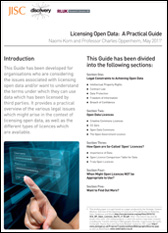Discovery Open Metadata Principles
Discovery, the metadata ecology for UK education and research, invites stakeholders to join us in adopting a set of principles to enhance the impact of our knowledge resources for the furtherance of scholarship and innovation.
Open metadata creates the opportunity for enhancing impact through the release of descriptive data about library, archival and museum resources. It allows such data to be made freely available and innovatively reused to serve researchers, teachers, students, service providers and the wider community in the UK and internationally.
Libraries, archives and museums exist in an environment where they, their stakeholders and partners share an interest in exposing and repurposing metadata.
Government and the wider community are increasingly embracing a commitment to openness, sharing and reuse of metadata, especially where resources have been collected using public funds.
We therefore recognise the importance of promoting a clear endorsement of open metadata with practical guidance about licensing.
We recommend that institutions and agencies should proceed on the presumption that their metadata is by default made freely available for use and reuse, unless explicitly precluded by third party rights or licences.
-
We strongly advocate that all metadata releases require licensing, for which institutions and agencies should adopt a standard open licensing framework that is suited to their purposes.
-
Reference to permissible usage under the terms of a standard open licence will promote confident and appropriate use. When licensing open metadata in the majority of circumstances, the standard Open Data Commons Public Domain Dedication & Licence (ODC-PDDL), the broadly similar Creative Commons CC0 licence or the UK Open Government Licence (OGL) will be appropriate.
Avoidance of variations to such standard licences will make it easier to combine data from different resources and will reduce repeated requirement for legal advice.
Some questions about the Discovery statement
What is the purpose of this statement?
As an expression of commitment to Discovery, the metadata ecology for UK education and research, the RDTF signatories are inviting stakeholders to join in adopting a set of principles to enhance the impact of our knowledge resources for the furtherance of scholarship and innovation.What does signing up to it mean?
Signatories will be indicating that they support the principles and that they are committed to enacting them in appropriate areas of their work.What impact are we hoping for?
Institutions and agencies in the Library, Archive and Museum (LAM) sectors will be increasingly confident and motivated to enact these principles, or to enquire further, or to put them on their agenda.Who are the audiences?
Senior managers in the LAM sectors are the direct audience; indirectly, leading practitioners such as collection managers and also those with institutional governance such as university PVCs.How will it be disseminated?
The statement was launched on 26 May 2011; it will be a focus of subsequent communications and of the Discovery web presence. Most important, it will be spread by word of mouth including #UKdiscovery.Someone sees this and then what?
We hope they will adopt it and act on it in practical terms; in addition they may become a signatory. Alternatively they may seek clarification or pass it on to the right person in their organization.Is there any supporting material?
Supporting material is available on the Discovery website, including an introductory guide to licensing open data written by Naomi Korn and Prof. Charles Oppenheim and the Open Bibliographic Data Guide for libraries.
A PDF version of the Discovery Open Metadata Principles (PDF, 112 KB) is also available.
If you are interested in endorsing these principles on behalf of your organisation or if you have any queries about the principles please contact Andy McGregor (a.mcgregor@jisc.ac.uk).

